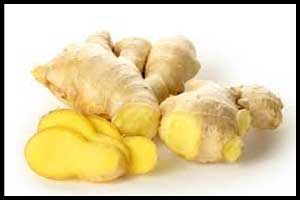- Home
- Editorial
- News
- Practice Guidelines
- Anesthesiology Guidelines
- Cancer Guidelines
- Cardiac Sciences Guidelines
- Critical Care Guidelines
- Dentistry Guidelines
- Dermatology Guidelines
- Diabetes and Endo Guidelines
- Diagnostics Guidelines
- ENT Guidelines
- Featured Practice Guidelines
- Gastroenterology Guidelines
- Geriatrics Guidelines
- Medicine Guidelines
- Nephrology Guidelines
- Neurosciences Guidelines
- Obs and Gynae Guidelines
- Ophthalmology Guidelines
- Orthopaedics Guidelines
- Paediatrics Guidelines
- Psychiatry Guidelines
- Pulmonology Guidelines
- Radiology Guidelines
- Surgery Guidelines
- Urology Guidelines
Ginger helpful in reduction of bad breath

A new study has found that 6-gingerol, a constituent of ginger, stimulates an enzyme in saliva responsible for breaking down foul-smelling substances, thus ensuring fresh breath and a better aftertaste.
The study, published in the Journal of Agricultural and Food Chemistry, further demonstrates that citric acid increases the sodium ion content of saliva, making salty foods taste less salty.
Thomas Hofmann, Chair of Food Chemistry and Molecular Sensory Science, and colleagues conducted the study to investigate the effects of food components on the molecules dissolved in saliva.
Many food components contribute directly to the characteristic taste of food and beverages by means of contributing their own particular taste, scent or spiciness. However, they also indirectly influence our sense of taste via other, still largely unknown biochemical mechanisms.
Also Read: Ginger – New proven option to treat vomiting in children with Gastroenteritis
6-Gingerol contributes to fresh breath
As the results of this study show, the pungent principle of ginger, the so-called 6-gingerol, makes the level of the enzyme sulfhydryl oxidase 1 in saliva increase 16-fold within a few seconds. The saliva and breath analyses carried out on human volunteers show that the enzyme breaks down malodorous sulfur-containing compounds. In this way, it is able to reduce the long-lasting aftertaste of many foods such as coffee. "As a result, our breath also smells better," explains Prof. Hofmann, who headed the study. The mechanism discovered could contribute to the future development of new oral hygiene products, says the head of the Leibniz- Institute for Food Systems Biology at the TUM.
Citric acid influence on our taste perception
According to the study, citric acid influences our perception of taste through a completely different mechanism. As everyone knows from personal experience, sour foods such as lemon juice stimulate salivation. The amount of minerals dissolved in saliva also increases in proportion to the amount of saliva.
According to Prof. Hofmann, the sodium ion level in saliva rises rapidly by approximately a factor of eleven after stimulation with citric acid. This effect makes us less sensitive to table salt. The food chemist explains: "Table salt is nothing other than sodium chloride, and sodium ions play a key role in the taste of salt. If saliva already contains higher concentrations of sodium ions, samples tasted must have a significantly higher salt content in order to taste comparatively salty."
"A great deal of research still needs to be done in order to understand the complex interaction between the molecules in food that create taste, the biochemical processes that take place in saliva and our sense of taste," conclude the authors.
For further information log on to 10.1021/acs.jafc.8b02772

Disclaimer: This site is primarily intended for healthcare professionals. Any content/information on this website does not replace the advice of medical and/or health professionals and should not be construed as medical/diagnostic advice/endorsement or prescription. Use of this site is subject to our terms of use, privacy policy, advertisement policy. © 2020 Minerva Medical Treatment Pvt Ltd